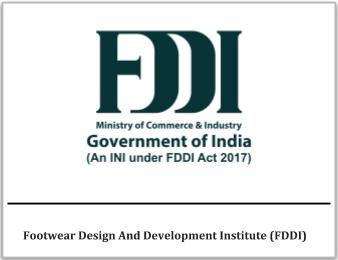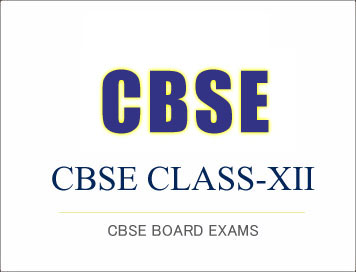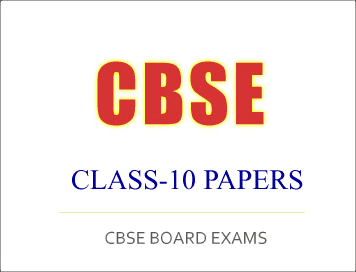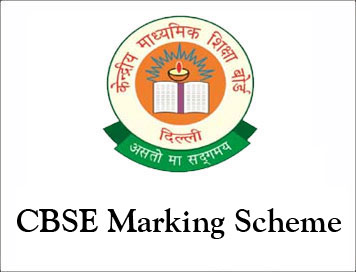CBSE PORTAL : “(Notification) Footwear Design And Development Institute (FDDI)-2020” plus 4 more |  |
- (Notification) Footwear Design And Development Institute (FDDI)-2020
- (Download) CBSE Class-12 Sample Paper 2019-20 : Food & Beverage Cost and Control
- (Download) CBSE Class-10 Sample Paper And Marking Scheme 2019-20: Marketing And Sales
- CBSE Class-12 Exam 2019 : Marking Scheme, Entrepreneurship
- CBSE Class-10 Exam 2019 : Marking Scheme, Arabic
| (Notification) Footwear Design And Development Institute (FDDI)-2020 Posted: 25 Jan 2020 03:55 AM PST
(Notification) Footwear Design And Development Institute (FDDI)-2020ABOUT :Footwear Design & Development Institute was established in 1986, under the aegis of Ministry of Commerce & Industry, Govt. of India with major objectives:
FDDI is playing a key role in imparting education, facilitating the Indian industry by bridging the skill gap in the areas of Footwear, Fashion, Retail and Leather Accessory & life style product, and because of its continuous contribution towards nation building, FDDI has been granted the status of “Institution of National Importance” under the FDDI Act 2017. FDDI is a premier academic and training institution dedicated to the development and growth of the Footwear & Product, Leather Products, Retail and Fashion Merchandise and Fashion Design sectors. FDDI has Pan India Presence with 12 state-of art campuses spread across the country. It has world class Infrastructure & Facilities (equipped with Smart Class Rooms, Workshops with latest machineries & equipment’s, High tech IT lab, High end Product development Centre, International Testing Centre, Comprehensive Library, Auditorium & Sports facilities, and In campus Hostels etc.), created across the functional domain to ensure international standards of higher education, training & delivery for Footwear, Leather products, Retail and Allied Industries - 360° interventions under one umbrella. The Institute is awarded with prestigious certifications and accreditations such as ISO 17025 accreditation by DAkkS- Germany, SATRA Technology Center- UK, ISO 9001 and ISO 14000 Certification and Bureau of Indian Standard Certification among various others. FDDI offers Bachelor and Master degree programmes in the areas of Footwear Design & Production, Fashion Design, Retail & Fashion Merchandise and Leather Goods & Accessories Design, besides offering short term Industry specific programmes. FDDI is known for nurturing high end trained specialized professionals through its programmes. The Institute has a strong Alumni base and strong industry linkage. Almost all the leading Industries of the country are associated with the Institute and have a key participation in academic matters such as Programme design, curriculum upgradation, expertise lectures, as academic and governing council members etc. Due to the excellent quality of skill development, contemporary industry oriented curriculum and hands on experience on state of the art machine and workshops, FDDI holds an excellent record of placements in the industry ADMISSION CALENDAR :
FEE STRUCTURE :
AGE LIMIT :FOR BACHELOR DEGREE PROGRAMMES (B.DES. / BBA):
Age limit for master degree programmes (MBA/ M.DES.):
ELIGIBILITY CRITERIA :1. ELIGIBILITY FOR ADMISSION TO BACHELOR DEGREE PROGRAMMES (B.DES. / BBA) B. A candidate who has appeared for any examination under clause (A), and whose result has not been declared at the time of admission, shall be eligible to apply for admission to the Bachelor’s Programmes and such candidate, if selected, shall be granted provisional admission and shall be required to submit the result of the requisite examination on or before the 30th day of September 2020 to the Admission In Charge where the admission has been granted, failing which the candidate’s admission may be cancelled and entire fee will be forfeited. Such candidates have to produce proof of having appeared for the examination during the Counseling process of FDDI programmes. 2. ELIGIBILITY FOR ADMISSION TO MASTER DEGREE PROGRAMMES A. MASTER OF DESIGN (M. DES.) IN FOOTWEAR DESIGN & PRODUCTION: HOW TO APPLY :1) Candidates are required to apply online through website: https://applyadmission.net/fddi2020 They can access this website also through the ‘Admission 2020 - Apply now!’ banner on the homepage of official website of FDDI (http://www.fddiindia.com) SUBMISSION OF APPLICATION FORM Important Dates :
Click here to Download Official NotificationClick here to apply onlineCourtesy: FDDI | |||||||||||||||||||||||||||||||||||||||||||||||||||||||||||||||||||||||||||||||||||||||||||||||||||
| (Download) CBSE Class-12 Sample Paper 2019-20 : Food & Beverage Cost and Control Posted: 24 Jan 2020 11:36 PM PST
(Download) CBSE Class-12 Sample Paper 2019-20 : Food & Beverage Cost and ControlClass: XII
SECTION –AAnswer any 10 questions out of the given 12 questions: 1. Define Food cost. 2. What will be the result if the food cost is more than the total sales? 3. Give one example of fixed cost. 4. What is the rule of FIFO? 5. List any two instruments used for the beverage sales control. 6. What is VTL? Why is it made? 7. Write two advantages of Specific Quantity Contract. 8. Name two major equipments used by the receiving department. 9. List any two facilities required by a good receiving department. 10. Write the main use of Transfer notes. 11. At what temperature should sparkling wines be stored? 12. Write the main advantage of using a standard recipe book in Hotels.
| |||||||||||||||||||||||||||||||||||||||||||||||||||||||||||||||||||||||||||||||||||||||||||||||||||
| (Download) CBSE Class-10 Sample Paper And Marking Scheme 2019-20: Marketing And Sales Posted: 24 Jan 2020 11:36 PM PST | |||||||||||||||||||||||||||||||||||||||||||||||||||||||||||||||||||||||||||||||||||||||||||||||||||
| CBSE Class-12 Exam 2019 : Marking Scheme, Entrepreneurship Posted: 24 Jan 2020 11:17 PM PST | |||||||||||||||||||||||||||||||||||||||||||||||||||||||||||||||||||||||||||||||||||||||||||||||||||
| CBSE Class-10 Exam 2019 : Marking Scheme, Arabic Posted: 24 Jan 2020 11:16 PM PST
CBSE Class-10 Exam 2019 : Marking SchemeQuestion Paper, ArabicCBSE Class-10 Exam 2019 : Arabic
General Instruction : 1. You are aware that evaluation is the most important process in the actual and correct assessment of the candidates. A small mistake in evaluation may lead to serious problems which may affect the future of the candidates, education system and teaching profession. To avoid mistakes, it is requested that before starting evaluation, you must read and understand the spot evaluation guidelines carefully. Evaluation is a 10-12 days mission for all of us. Hence, it is necessary that you put in your best efforts in this process. 2. Evaluation is to be done as per instructions provided in the Marking Scheme. It should not be done according to one’s own interpretation or any other consideration. Marking Scheme should be strictly adhered to and religiously followed. However, while evaluating, answers which are based on latest information or knowledge and/or are innovative, they may be assessed for their correctness otherwise and marks be awarded to them. 3. The Head-Examiner must go through the first five answer books evaluated by each evaluator on the first day, to ensure that evaluation has been carried out as per the instructions given in the Marking Scheme. The remaining answer books meant for evaluation shall be given only after ensuring that there is no significant variation in the marking of individual evaluators. 4. If a question has parts, please award marks on the right-hand side for each part. Marks awarded for different parts of the question should then be totaled up and written in the left-hand margin and encircled. 5. If a question does not have any parts, marks must be awarded in the left hand margin and encircled. 6. If a student has attempted an extra question, answer of the question deserving more marks should be retained and the other answer scored out. 7. No marks to be deducted for the cumulative effect of an error. It should be penalized only once. 8. A full scale of marks 1-80 has to be used. Please do not hesitate to award full marks if the answer deserves it. 9. Every examiner has to necessarily do evaluation work for full working hours i.e. 8 hours every day and evaluate 25 answer books per day. 10. Ensure that you do not make the following common types of errors committed by the Examiner in the past:-
11. While evaluating the answer books if the answer is found to be totally incorrect, it should be marked as (X) and awarded zero (0) Marks. 12. Any unassessed portion, non-carrying over of marks to the title page, or totaling error detected by the candidate shall damage the prestige of all the personnel engaged in the evaluation work as also of the Board. Hence, in order to uphold the prestige of all concerned, it is again reiterated that the instructions be followed meticulously and judiciously. 13. The Examiners should acquaint themselves with the guidelines given in the Guidelines for spot Evaluation before starting the actual evaluation. 14. Every Examiner shall also ensure that all the answers are evaluated, marks carried over to the title page, correctly totaled and written in figures and words. 15. The Board permits candidates to obtain photocopy of the Answer Book on request in an RTI application and also separately as a part of the re-evaluation process on payment of the processing charges. Click Here to DownloadCourtesy: CBSE | |||||||||||||||||||||||||||||||||||||||||||||||||||||||||||||||||||||||||||||||||||||||||||||||||||
| You are subscribed to email updates from CBSE PORTAL : CBSE, ICSE, NIOS, CTET Students Community. To stop receiving these emails, you may unsubscribe now. | Email delivery powered by Google |
| Google, 1600 Amphitheatre Parkway, Mountain View, CA 94043, United States | |




